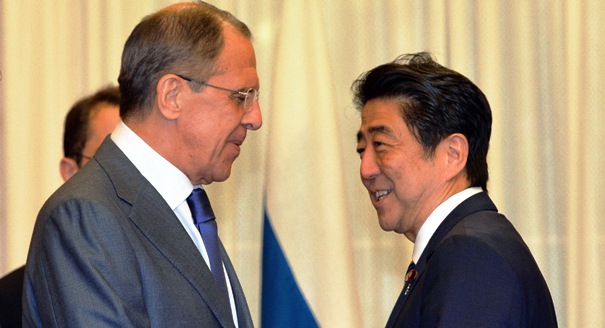With the blocking of Starlink terminals and restriction of access to Telegram, Russian troops in Ukraine have suffered a double technological blow. But neither service is irreplaceable.
Maria Kolomychenko
{
"authors": [
"Dmitri Trenin"
],
"type": "commentary",
"centerAffiliationAll": "",
"centers": [
"Carnegie Endowment for International Peace",
"Carnegie Russia Eurasia Center"
],
"collections": [],
"englishNewsletterAll": "",
"nonEnglishNewsletterAll": "",
"primaryCenter": "Carnegie Russia Eurasia Center",
"programAffiliation": "",
"programs": [],
"projects": [],
"regions": [
"North America",
"United States",
"East Asia",
"China",
"Japan",
"Russia"
],
"topics": [
"Foreign Policy"
]
}
Source: Getty
Strong Japanese-Russian relations are economically beneficial and a strategic counterbalance against China’s influence. But the Ukraine crisis and Japan’s U.S. loyalties could have damaging effects.
As Russian Foreign Minister Sergey Lavrov was visiting Beijing last week, it was announced that the visit to Moscow by Japan's Foreign Minister Fumio Kishida was being postponed. The announcement, of course, came amid the rising tensions in Ukraine and the continuing fundamental deterioration of the West's relations with Russia. Japan, after all, is a loyal ally of the United States.
Yet, both Tokyo and Moscow have gone to some lengths to limit the damage. The joint announcement was couched in most polite phrases. The Russian foreign ministry spokesman, Alexander Lukashevich, allowed no criticism in his public comments on the postponement decision. Clearly, with the threats of economic sanctions against Russia still on the table in Washington and in EU capitals, even after the recent Geneva agreement on Ukraine, Moscow looks to Tokyo to make up for the likely losses in Europe and North America.
None of this is going to be easy, but none of this is totally impossible either—provided the Japanese do their part by becoming what Germany, until recently, has been to Russia: a major technological partner, a leading investor, and a gateway to the wider region. Doing this will be exceedingly difficult, of course, in the current environment of intensifying U.S.-Russian rivalry. However, Abe may have a few useful arguments to offer to President Barack Obama when he comes to Tokyo soon.
Why should the U.S.-Russian rivalry be allowed to strengthen Beijing? Who benefits when the United States is less comfortable and Japan feels less safe? In this new cold period in Russian-Western relations, there are already a few protected areas of collaboration, like nonproliferation. Why not a vibrant Japan-Russia link too? After all, wasn't it the one missing piece, even a strategic oversight in the original U.S. "pivot to Asia" concept?
Carnegie does not take institutional positions on public policy issues; the views represented herein are those of the author(s) and do not necessarily reflect the views of Carnegie, its staff, or its trustees.
With the blocking of Starlink terminals and restriction of access to Telegram, Russian troops in Ukraine have suffered a double technological blow. But neither service is irreplaceable.

Maria Kolomychenko
Over the past two decades, regional collaboration in the South Caucasus has intensified. Turkey and the EU should establish a cooperation framework to accelerate economic development and diversification.



Feride İnan, Güven Sak, Berat Yücel
A new Carnegie survey of Indian Americans examines shifting vote preferences, growing political ambivalence, and rising concerns about discrimination amid U.S. policy changes and geopolitical uncertainty.



Milan Vaishnav, Sumitra Badrinathan, Devesh Kapur, …
In this moment of geopolitical fluidity, Türkiye and Iraq have been drawn to each other. Economic and security agreements can help solidify the relationship.


Derya Göçer, Meliha Altunışık
The main source of Russian aggression is a profound mistrust of the West and the firm belief that it intends to inflict a “strategic defeat” on Russia. As long as this fear persists, the war will not end.

Tatiana Stanovaya